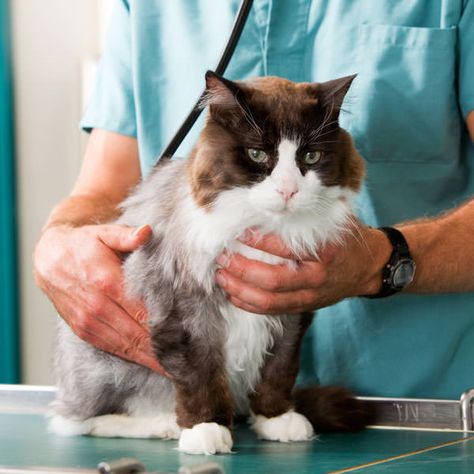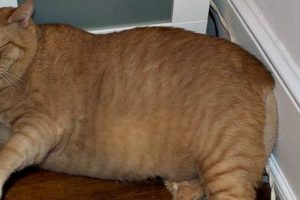Ascites in Cats

Ascites (pronounced “a-site-eez”) is the accumulation of fluid in a cat’s abdominal cavity.
While a swollen stomach is one of the most obvious signs of ascites, any dramatic shift in a cat’s appetite, weight, body temperature, excremental function or sudden sensitivity during a tummy rub can also be warning signs. And if fluid continues to accumulate unchecked in the cat’s abdomen, it will eventually create so much pressure that she may have trouble breathing.
As frightening as it sounds, however, ascites may all too often be a symptom of one of these five major conditions:
- Abdominal organ failure: Damage to or failure of the liver, kidneys and/or bladder can cause feline ascites. When operating properly, these organs’ vital functions include the conversion and metabolization of nutrients, filtration and waste removal. If the liver or kidneys are ruptured or fail, they release fluid into the abdomen that can quickly become septic. (possible reasons for both: ingesting chemicals or toxins, excessive heat, dietary imbalances, infection and metabolic dysfunction). A ruptured bladder can be caused by a urinary tract infection, blockages of the urinary tract or disease. When the urine has nowhere to go, the bladder can tear, releasing that urine into the abdomen, irritating the peritoneum, which, in turn, releases more fluid.
- Feline infectious peritonitis (FIP): Caused by a virus that thrives in white blood cells, there are two forms of FIP, and the one that produces swelling of the peritoneum is “effusive” or wet. Once the mutated virus becomes active, it impairs a cat’s immune system, especially affecting the abdominal lining and kidneys. Not only is FIP difficult to diagnose, it’s almost impossible to cure.
- Right-sided congestive heart failure: The right side pumps fresh, oxygenated blood through a cat’s body, and with congestive heart failure, the heart is incapable of doing this. (possible causes include a thickening of the heart muscle, heart worms and high blood pressure). While right-sided congestive heart failure can be genetic and affect younger cats, it more often affects older cats. As the cat’s heart strains to pump fresh blood through her body, fluids begin to accumulate everywhere, including the abdomen.
- Cancer: A mass or tumor anywhere in a cat’s abdominal cavity can cause a blockage and disrupt the normal functioning of her organ(s). Fluids that would usually be filtered by the affected organ(s) may then either back up or leak out into her abdomen.
- Physical trauma: If a cat experiences any sort of physical trauma, from accidents to abuse, these injuries can damage her internal organs. A torn or ruptured vital organ will lead to internal hemorrhaging which, in turn, leaks either blood or fluid into the abdomen, irritating the peritoneum and causing the abdomen to swell.
To accurately diagnose ascites in a cat, a vet will first perform a thorough physical examination of her abdomen to check for pain or discomfort, then order blood and urine tests, and perhaps even x-rays and an ultrasound. A key component of the investigation, however, is drawing and analyzing a sample of her abdominal fluid to help narrow the list of possible causes. The blood and urine tests will detect any chemical imbalances or infections while the x-rays and ultrasound should reveal which organ(s) or system is affected.
Once a diagnosis has been made, treatment depends on the underlying cause of her fluid buildup. Corrective surgery may be needed to repair a ruptured organ or remove a tumor, while medications such as cat antibiotics may be prescribed if she’s suffering from a bacterial infection. Sadly, however, the disorders that cause ascites tend to be ominous, making the prognosis either guarded or poor. And because it often occurs at the end stages of a disorder without a cure, the focus of any treatment plan must therefore change accordingly — from resolution to management.


